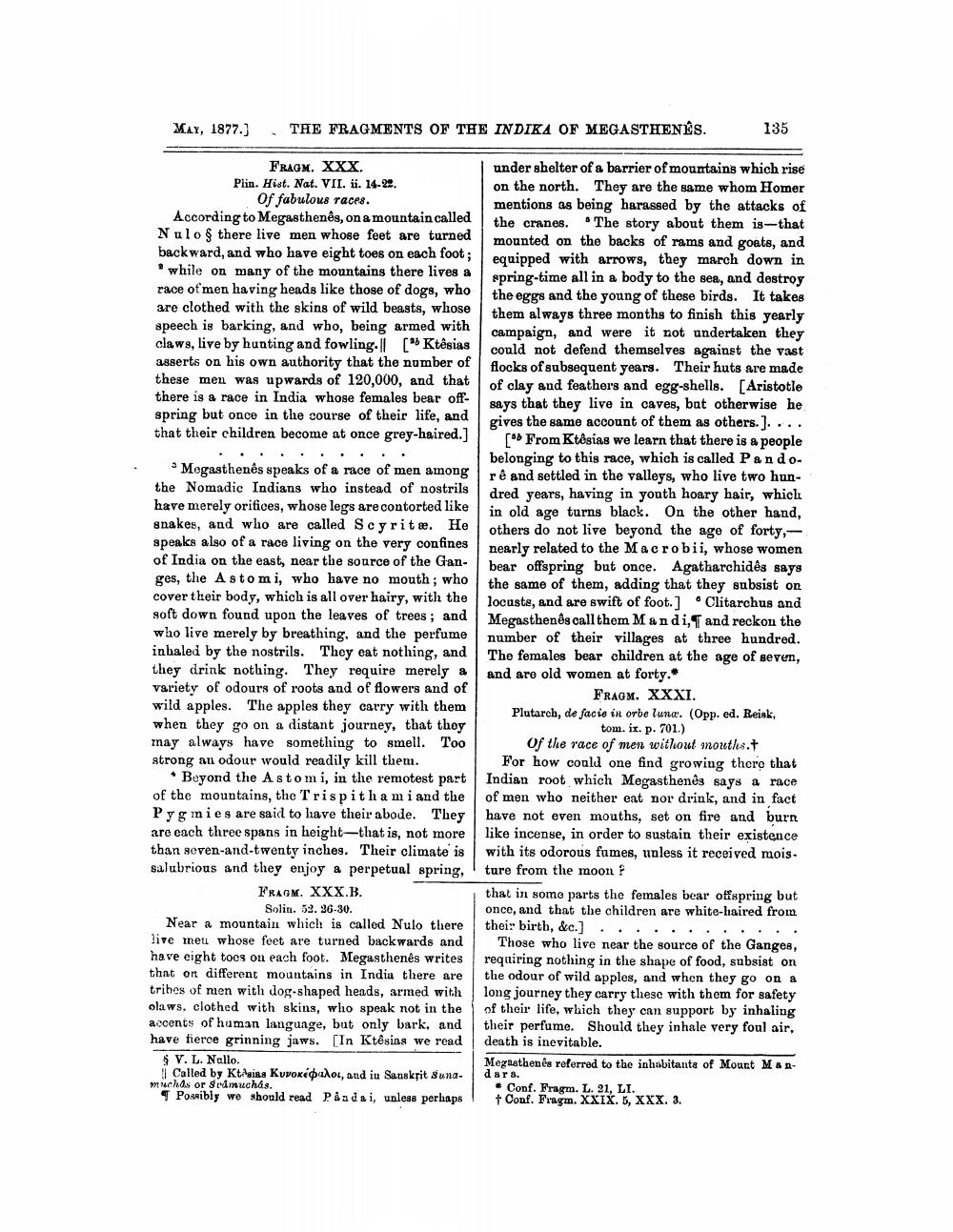________________
MAY, 1877.)
THE FRAGMENTS OF THE INDIKA OF MEGASTHENS.
135
FRAGM. XXX. Plin. Hist. Nat. VII. ü. 14-2..
Of fabulous races. According to Megasthenès, on a mountain called Nulo & there live men whose feet are turned backward, and who have eight toes on each foot; * while on many of the mountains there lives a race of'men having heads like those of dogs, who are clothed with the skins of wild beasts, whose speech is barking, and who, being armed with claws, live by hunting and fowling. || ["Ktesias asserts on his own authority that the number of these men was upwards of 120,000, and that there is a race in India whose females bear offspring but once in the course of their life, and that their children become at once grey-haired.]
Megasthenes speaks of a race of men among the Nomadic Indians who instead of nostrils have merely orifices, whose legs are contorted like snakes, and who are called Scyritæ. He speaks also of a race living on the very confines of India on the east, near the source of the Ganges, the Astomi, who have no mouth; who cover their body, which is all over hairy, with the soft down found upon the leaves of trees; and who live merely by breathing, and the perfume inhaled by the nostrils. They eat nothing, and they drink nothing. They require merely & variety of odours of roots and of flowers and of wild apples. The apples they carry with them when they go on a distant journey, that they may always have something to smell. Too strong an odour would readily kill them.
* Beyond the Astomi, in the remotest part of the mountains, the Trispitha mi and the Pyginies are said to have their abode. They are each three spans in height--that is, not more than seven-and-twenty inches. Their climate is salubrious and they enjoy a perpetual spring,
FRAGM. XXX.B.
Solin. 53. 36-30. Near a mountain which is called Nulo there live met whose feet are turned backwards and have eight tocs on each foot. Megasthenes writes that ort different mountains in India there are tribes of men with dog-shaped heads, armed with olaws. clothed with skins, who speak not in the accents of human language, but only bark, and have fierce grinning jaws. [In Ktêsias we read $ V. L. Nallo.
Called by Ktains Kuvoké us, and in Sanskrit Suna. muchas or Sedmuchas.
Possibly we should read Piada i, unless perhaps
under shelter of a barrier of mountains which rise on the north. They are the same whom Homer mentions as being harassed by the attacks of the cranes. The story about them is-that mounted on the backs of rams and goats, and equipped with arrows, they march down in spring-time all in a body to the sea, and destroy the eggs and the young of these birds. It takes them always three months to finish this yearly campaign, and were it not undertaken they could not defend themselves against the vast flocks of subsequent years. Their huts are made of clay and feathers and egg-shells. [Aristotle says that they live in caves, bat otherwise he gives the same account of them as others.....
[From Ktosias we learn that there is a people belonging to this race, which is called Pandorê and settled in the valleys, who live two hundred years, having in youth hoary hair, whick in old age turns black. On the other hand, others do not live beyond the age of fortynearly related to the Macrobii, whose women bear offspring but once. Agatharchidês says the same of them, adding that they subsist on locusts, and are swift of foot.] Clitarchus and Megasthenés call them Mandi,T and reckon the number of their villages at three hundred.
The females bear children at the age of seven, and are old women at forty.
Fragm. XXXI. Plutarch, de facis in orbe luna. (Opp. ed. Reisk,
tom. ir. p.701.) Of the race of men without mouths. For how could one find growing thero that Indian root which Megasthenes says a race of men who neither eat nor drink, and in fact have not even mouths, set on fire and burn like incense, in order to sustain their existence with its odorous fumes, unless it received mois. ture from the moon ? that in some parts the females bear offspring but once, and that the children are white-haired from their birth, &c.] . . . . . . . . . . . .
Those who live near the source of the Ganges, requiring nothing in the shape of food, subsist on the odour of wild apples, and when they go on a long journey they carry these with them for safety of their life, which they can support by inhaling their perfume. Should they inhale very foul air, death is inevitable. Megasthenes referred to the inhabitants of Mount Mandars.
* Conf. Fragm. L. 21, LI. + Conf. Fragm. XXIX. 5, XXX. 3.




